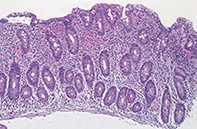Peer Reviewed
Gastroenterology clinic
Investigating a patient with a positive test for positive antigliadin antibodies
Abstract
Serological testing for coeliac disease has made screening much more accessible for people with suspicious symptoms or a family history of the condition. However, positive serology does not equal a diagnosis. Dr Demediuk explores traps for the unwary.
Key Points
- Coeliac disease (gluten sensitive enteropathy) is underdiagnosed. Classic signs and symptoms of malabsorption are uncommon, and patients often present with either mild symptoms or clinically silent disease. Coeliac disease is not just a disease of childhood, and the diagnosis is now commonly made in adults.
- Think of coeliac disease in patients with unexplained iron or folate deficiency, nonspecific gastrointestinal symptoms (often diagnosed as irritable bowel syndrome) or osteopenia, as well as the relatives of patients who have coeliac disease. About 10% of first degree relatives may be affected.
- A positive test for antigliadin antibodies may indicate that an individual has coeliac disease. However, histology of the small bowel mucosa is essential to confirm the diagnosis, and will classically show villous atrophy in patients with coeliac disease (Figure 1). Duodenal biopsies are usually obtained at gastroscopy.
Remember
Purchase the PDF version of this article
Already a subscriber? Login here.

